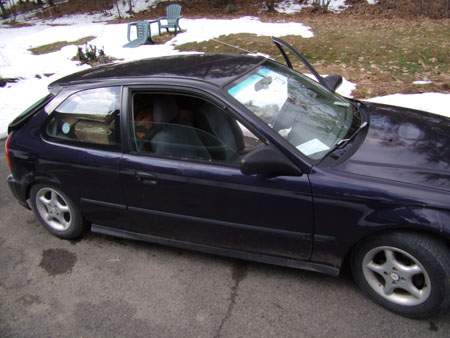|
|
|
three wood sorties
Wednesday, March 12 2008
A rare event was to take place in the next few at an "existing home" about five miles away. It was being sold. Yes, someone was actually making a real estate transaction in this horrifying post-housing-bubble market. What's more, we happened to know the seller, and she'd told us we could take her firewood before closing. So late this morning I was there at the soon-to-change-hands ranch house with my trusty Honda Civic Hatchback, standing in amazement before the enormous pile of wood, wondering how many sorties would be required to transfer it back home. I loaded the thing to the ceiling, leaving only enough room for me to drive and the two dogs to crowd together in the passenger seat. When it comes to relating what I'm talking about in terms of payload, perhaps pictures are best.

The glare conceals it a bit, but you can see the wood stacked up in the back of the car.

This is how much wood can be fit into a Honda Civic Hatchback, leaving empty seats for the passenger and driver.
I ended up being able to retrieve all the wood in only three sorties, leaving only a dozen or so pieces that were frozen inextricable to the ground. I'd actually taken too much; I hadn't gotten the memo but supposedly the word was that we could take "some" as opposed to "all." Hell, thinking the seller was never going to return to the house, I'd taken the tarp and firewood carrier too. So I actually had to put that stuff and a little firewood aside to take back.
All the firewood work I'd done today had taken nearly five hours. Though it had been dull menial work, it hadn't been as unpleasant as it might have been because I'd been able to listen to various podcasts and the radio as I'd worked. The radio this afternoon had been dominated by news of Eliot Spitzer's resignation from the Governorship of New York in the aftermath of a scandal involving a high-end prostitute. When news of the scandal first broke a few days ago I'd found it both highly surprising and a little depressing, but by now I was interested in knowing who the new governor would be. His name is David Paterson and will be New York's first legally blind governor. Not only that, he's nearly as black as Colin Powell. That means something in a country that has only had three black governors in all its history. It's probably had more (depending on how you count them) three-headed human babies born alive.
This evening Gretchen and I went to Bard College to see a debate between its president, Leon Botstein, and Bard professor of "advanced theology" Bruce Chilton on the topic: "Resolved: The United States is too Religious," with Botstein (an agnostic) in the affirmative and Chilton (who wears an sanctifying stiff white collar) in the negative. Botstein and Chilton each had two Bard students to help them argue their cases.
But I'm getting ahead of myself. Before we entered the place where the debate was to be held (Olin Auditorium), we noted a table where free sandwiches and wine were being given to anyone who wanted it. "I'm surprised there aren't more homeless people here," I observed, plastic cup of Yellow Tail in hand.
The auditorium was nearly full to capacity, mostly with Bard students (who look a lot like the Oberlin students I went to college with; with the exception of facial piercings, college student fashions haven't changed much in twenty years).
Before the debate, a sophomore master of ceremonies had us raise our hands for two questions. Did we believe that America was too religious? (Gretchen and I raised our hands, as did about half the auditorium.) The other question wanted to know if we though America was not too religious. The other half of the auditorium put up their hands, including the young woman texting on her cellphone to my immediate left. (I have never text'd in my life.)
The debate was much duller and less substantial than I had been expecting. Botstein said that he had no problem the way he put it was neither as succintly nor as eloquent). Botstein's voice and manner of speaking reminded me of William F. Buckley Jr., though perhaps without Buckley's hint of the deep south. Botstein must have attended the same prestigious WASPy prep schools. (It bears noting that Leon Botstein is now in his 60s but has been president of Bard since his late 20s.)
As for Chilton, his one device for responding to Botstein was to say that all Botstein's problems with religion apply only to religious fundamentalism, and that he, Chilton, is as repulsed by fundamentalism as anyone. At no point did Chilton state any of his religious beliefs or speak of a particular religious belief that has proved useful to our species, thereby revealing himself to be a champion of the irrational, which is what I had hoped he would do. It was all terribly disappointing.
At the end people in the audience were given the opportunity to ask questions of the people on stage, and it was all fairly blah except for the one clean white girl with long straight shiny hair who complained about "attitudes on campus" regarding her devout Catholicism.
Gretch and I snuck out of the debate before the last audience questions were asked. We drove to Rhinecliff to hopefully dine at the China Rose. It was past 9:00pm and we worried we wouldn't be served, but the place was open and ready to rock and/or roll. (Let's!)
The China Rose is like no Chinese restaurant you've ever seen. Aside from perhaps one Buddha, you'd never be able to tell what kind of restaurant it was from the decor. It could have an Italian restaurant. Furthermore, none of the staff looked to have any sort of Asian heritage. Our waitress was an excessively perky white girl who kept apologizing for the lack of setting on our table.
The main thing about the China Rose is the food. It bears superficial resemblance to standard Chinese food, but everything is much more complicated than you expect. For small example, the mustard that came with the fried noodles before we ordered looked like your standard Chinese restaurant fried noodle mustard. But when we tasted it we realized it's something much more nuanced and gourmet. Gretchen wanted to know what was in it, but when the perky waitress asked in the kitchen she learned that its recipe was a secret, as well it should be. The main courses were just as complex and delicious, and it was hard to stop eating even after we were full. When the waitress asked if we wanted dessert, Gretchen said that if she had any more room she'd just want to keep eating the food we'd ordered.
That religious debate we'd just attended got us talking about religion over our delicious Chinese food. Whenever the subject of religion comes up, I always managed to steer the conversation into a discussion of aspects of conventional religious belief that break under the slightest logical analysis. The religious notion that makes the least sense of all is that of the eternal afterlife. I made the observation that Christian Heaven is such a different place from Earth that the change required to live there "for eternity" is enough to render the person going there "a completely different person." When your motivations on Earth are sex, success, advancement, and the seeking of competitive advantage, what kind of eternity can you have in an afterlife where those things either cannot be had or make no sense? You'd have to have your brain completely rewired. Sure, perhaps you'd still have your memories of your few brief decades on Earth, but supposedly the all-knowing God has those anyway, so why not just die away and let those memories serve out their eternity in God's "brain" (along with all the files you've lost from hard drive crashes)? Gretchen thought that an eternity of comfort and the "absence of want" might well sound very appealing to the hard working poor, the historic target of Christian evangelism. "But how is comfort and the absence of want any different from just dying and not going anywhere?" I asked. "But you're conscious in Heaven," said Gretchen. Ah, peace and quiet with consciousness. The "with consciousness" is all that separates the atheist's idea of the afterlife from the Christian's. But what does consciousness in Heaven really mean? Supposedly Heaven is full of our dead ancestors, some of whom we miss a great deal. They're in Heaven, so they can have anything they want, so why don't they pick up the phone and give us a call? Perhaps it is because they can't (meaning that not all desires are satisfied in Heaven) or maybe it is because they don't want to (meaning that Heaven changes people to the point where they lose interest in their dear loved ones). Either way, Heaven can't be all that it's advertised to be. Convert, beware.
For linking purposes this article's URL is:
http://asecular.com/blog.php?080312 feedback
previous | next |

